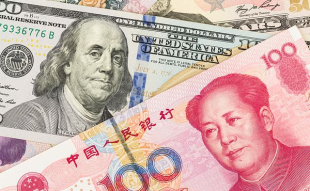Join Our Telegram channel to stay up to date on breaking news coverage
Crypto aficionados are already celebrating their victories on Twitter as the financial industry is still in uproar, this time over Credit Suisse.
The macroeconomic environment for Bitcoin has never been better, according to Mechanism Capital co-founder Andrew Kang.
The macro backdrop for $BTC has never been more perfect
– Fed must reduce aggressiveness in rate hikes with economy slowing & global financial system turmoil
– Equities not attractive given slowing sales & high PE
– Bonds offer mediocre yield & R/R profile
– Fiat increasingly… pic.twitter.com/g0sd52UzDD— Andrew Kang (@Rewkang) March 15, 2023
Others echoed the emotion and declared that “Bitcoin was built for this,” making reference to the inscription found in the network’s initial block.
Yet, looking past the noise reveals a much more complicated picture, one that highlights how closely tied to the Federal Reserve’s monetary policy Bitcoin and cryptocurrencies are.
It all comes down to interest rate increases and how hazardous investors think digital assets are.
Investors turn away from riskier investments like equities and cryptocurrencies in favor of safer bets like U.S. Treasury Bills, whose yields have been trending upward as the Fed tightens as interest rates rise to contain inflation.
With the ongoing rolling bank failures in the U.S., caused by a combination of irresponsible fractional reserve banking, the Fed’s unpredictable rate fluctuations and poor risk management, the general public's erosion of trust in our banking system is reaching new levels.
— Misha Lederman (@mishalederman) March 15, 2023
Rate increases, however, can also put pressure on banks.
For instance, Will the SVB Collapse Put an End to the Crypto Winter? disclosed that it has switched to bonds having variable-term maturation periods. Nevertheless, SVB was compelled to sell these bonds before they matured as its tech and startup-focused client withdrew money to extend their runway, which resulted in a substantial loss and ultimately the demise of the bank last week.
President Biden is among those who have blasted SVB executives for the failure. Yet, other people have claimed that the Federal Reserve’s rate increases are also to blame.
So, halting rises would provide favorable conditions for high-risk assets like Bitcoin to flourish. Yet given the current state of the banking system, a halt may very well be in order.
Fed increases on hold?
A decline in market confidence in European bank equities on Wednesday increased the likelihood that the Federal Reserve will postpone interest rate increases.
According to the CME FedWatch tool, Fed funds futures suggested a 59% possibility that the Fed would pause its most aggressive tightening cycle in 40 years, nearly doubling from a 31% chance the day before.
Yesterday, when US bank stocks appeared to be stabilizing, it appeared likely that the central bank would continue hiking interest rates.
But everything changed when Reuters reported that Saudi National Bank, the organization’s largest lender, would not provide Credit Suisse with more financial assistance, causing the stock price of Credit Suisse to drop by over 25%.
Shares of other European banks like Commerzbank, BNP Paribas, and Societe Generale all fell by more than 8%. Less than an hour after markets started in the US, significant stock indices like the S&P 500 and the Nasdaq Composite fell 1.5% and 1%, respectively, due to Credit Suisse’s problems.
Crypto’s difficult winter transition
Nauman Sheikh, managing director of Wave Digital Assets, said in an interview with publication Decrypt that investors all over the world may become more risk-averse if financial market uncertainty persists. As a result, the price of risky assets like equities and cryptocurrencies may decline in the near future.
In the near term, if the entire globe is in a risk-off mentality, I believe [crypto] should follow down downwards as well, he added. He said that:
This is another example of a bank run that may definitely have a beneficial influence on crypto in the medium term.
Even if Bitcoin’s price increased by 11.3% to almost $24,800 at the time of publication, the top coin by market capitalization had decreased by 4.5% over the previous day, per CoinGecko. As of roughly $1,660, Ethereum was down 4.6%, after weekly gains of 6.3%.
Since the Fed’s tightening has been a major factor in the value of both stocks and cryptocurrencies, Bitcoin still exhibits a strong link with stock indices like the Nasdaq and S&P 500, notwithstanding recent advances.
Amid a regulatory crackdown on the digital assets industry—the New York Attorney General’s office claimed Ethereum is a security in its lawsuit against cryptocurrency exchange KuCoin announced earlier this month—the recent failures of Signature and Silvergate have also raised questions about the ability of crypto-native firms to establish banking partnerships.
Despite this, Sheikh noted that the crypto asset class has demonstrated evidence of resilience during a turbulent period for the global markets.
Although there aren’t as many crypto banks these days and the regulations are unmistakably anti-crypto, Sheikh claimed that the technology is still thriving.
I find the way it has worked to be astonishing.
James Butterfill of CoinShares is one analyst who has said that the recent rise in cryptocurrency prices is an indicator of investors’ rising skepticism of banks as the financial system begins to crumble.
James Knightley, chief international economist at ING Bank, added that the idea that the Fed would suspend rates or even decrease them in reaction to stress in the banking sectors is advantageous for risk assets.
In response to Binance‘s announcement on Monday that it would exchange $1 billion of its BUSD stablecoin for Bitcoin, Ethereum, and the exchange’s native token, BNB, some, like Kaiko’s Head of Research Clara Medalie, have argued that a potential change in the Fed’s attitudes toward interest rate hikes doesn’t provide a complete picture.
Regarding the Fed, the future of cryptocurrency depends on how successfully the institution can strike a balance between maintaining financial stability and combating price increases.
Following its policy meeting, which is set for next week, the Fed will make its next move.
Related
- Will the SVB Collapse Put an End to the Crypto Winter?
- Silicon Valley Bank collapses, triggers bank run in USDC
- All deposits at SVB, Signature Bank will be guaranteed by the U.S. Treasury, FDIC, and Federal Reserve in an unforeseen move
Join Our Telegram channel to stay up to date on breaking news coverage


